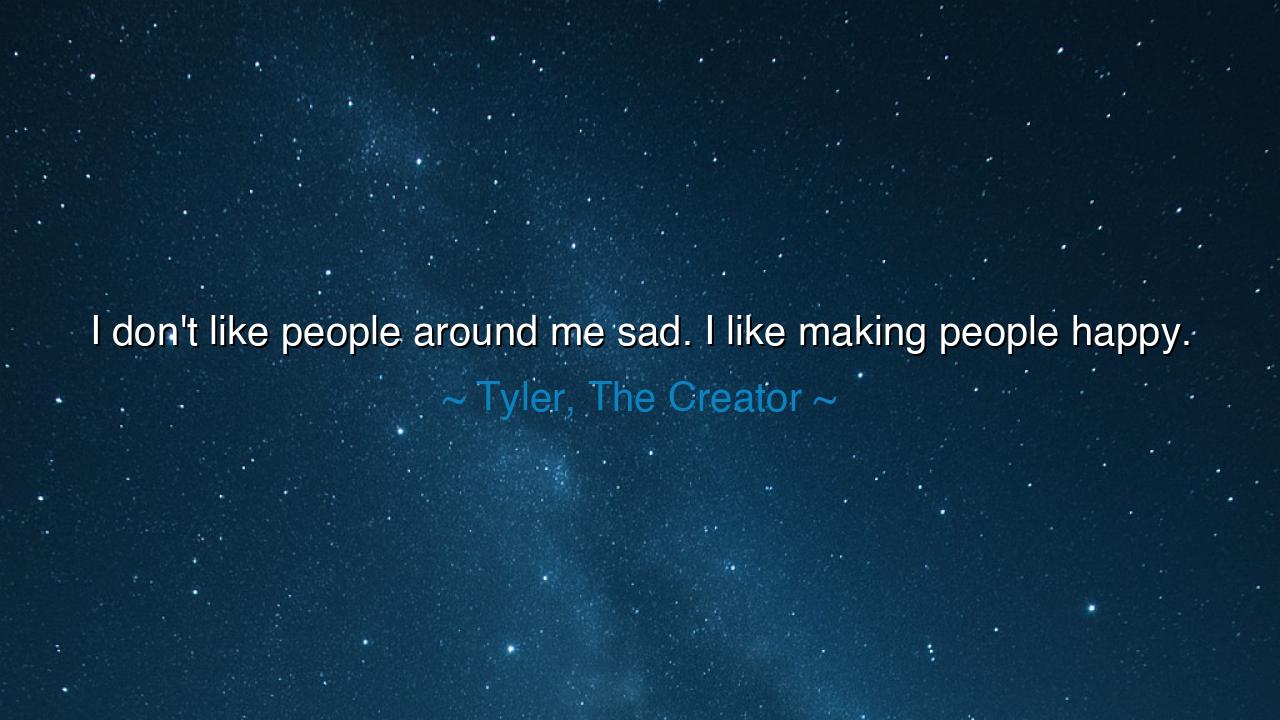
I don't like people around me sad. I like making people happy.






The words of Tyler, The Creator, “I don’t like people around me sad. I like making people happy,” are more than the playful remark of an artist—they are the declaration of a soul that has chosen light over darkness. Within these simple words lives a truth that has echoed through every age: that joy is not merely a feeling, but a duty, a sacred act of creation. To bring happiness to others is to stand against the endless tide of sorrow that so often floods the human heart. Tyler’s statement is both a confession and a calling—a vow to be a bearer of warmth in a world that can grow unbearably cold.
From the beginning of time, mankind has sought light, both physical and spiritual. Fire was the first symbol of civilization not only because it gave warmth, but because it gathered people together. Around the flame, stories were told, laughter was shared, and fears were kept at bay. Tyler’s desire to make people happy is that same ancient instinct—the wish to keep the fire burning in the hearts of others. He recognizes that sadness is not just an emotion, but a shadow that spreads when left unchecked. By choosing to bring joy, he becomes a modern keeper of that ancestral flame.
In this quote lies also the wisdom of compassion. To dislike seeing others sad is not vanity—it is empathy. It is the understanding that human beings are connected through invisible threads of feeling. When one suffers, all are affected. Tyler’s words reflect the insight that those who carry joy have a responsibility to share it. He does not turn from the sadness of others with indifference; instead, he responds with action—with laughter, creativity, and energy. His art, his humor, his eccentricity—all are his weapons against despair. In this way, he joins the company of those rare souls who transform their own brightness into healing for others.
The ancients told a story of Democritus, the Greek philosopher who was known as “the laughing sage.” In a time of turmoil, when war and greed consumed men’s hearts, he refused to surrender to bitterness. Instead, he laughed—not mockingly, but as an act of defiance, a way to remind humanity of its absurd beauty. His laughter, like Tyler’s joy, was not born of ignorance but of wisdom—the wisdom that to despair is easy, but to choose joy in a sorrowful world is the mark of true strength. Both men, in their own ages, stood as reminders that happiness is not mere pleasure; it is courage made radiant.
Yet, Tyler’s quote carries another layer of truth—a recognition of responsibility in community. When one says, “I like making people happy,” it is not only a preference but a pledge. It is to take up the humble role of a healer, even if the medicine is laughter. To bring happiness is not to deny sadness—it is to confront it with light. Every word of encouragement, every small act of kindness, every spark of humor becomes a torch in another’s darkness. In this way, the joy-bringer becomes a guardian of hope, one who restores the balance of the human spirit.
However, we must not mistake his joy for naïveté. Those who carry light often know darkness intimately. The strongest desire to make others happy often comes from those who have tasted loneliness and sorrow themselves. Tyler’s own journey—marked by creativity, controversy, and transformation—reveals a man who learned that the truest art is not only to express pain, but to transmute it into joy. To bring smiles where there were none is not a small act; it is a rebellion against despair itself. He who creates laughter creates strength, and he who restores joy restores life.
The lesson is eternal: be a source of light. When those around you are sad, do not look away. Bring warmth, humor, and understanding. The world has enough critics, cynics, and mourners; what it lacks are bringers of joy, souls who heal through presence. Do not underestimate the power of a kind word, a shared laugh, a moment of listening. These are the threads that hold humanity together. As Tyler teaches, it is a noble calling to make people happy—not for glory, but for love. For in doing so, you become what every age has needed most: a creator of light in a darkened world, and a reminder that joy, when shared, is the purest form of strength.






AAdministratorAdministrator
Welcome, honored guests. Please leave a comment, we will respond soon